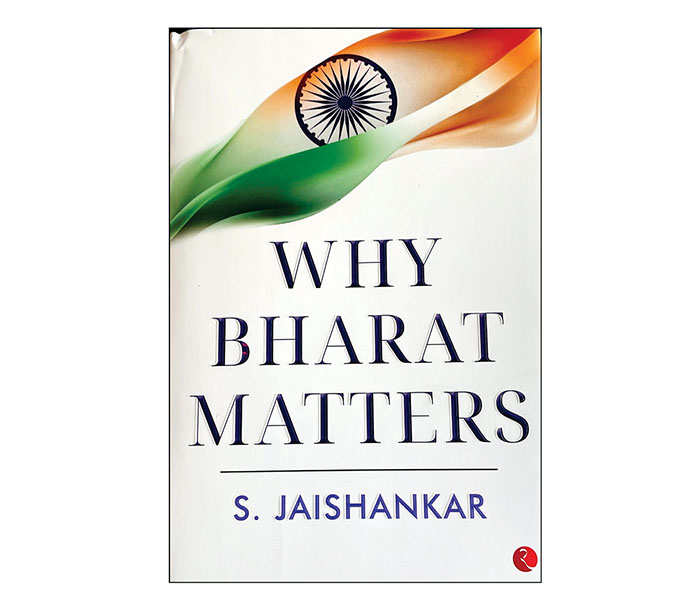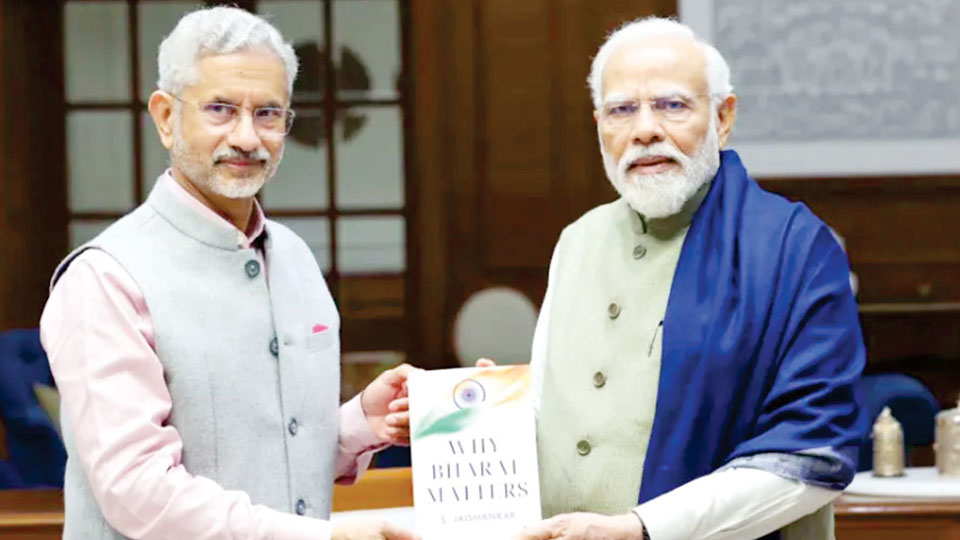By R. Chandra Prakash
Title : Why Bharat Matters
Author : S. Jaishankar
Year : 2024
Pages : 226
Price : Rs. 695
Publisher : Rupa Publications India Pvt. Ltd,.
In 2019, Indian Air Force (IAF) planes bombed Balakot in Pakistan. This was a retaliatory action in response to Pulwama terrorist attack by Pakistan- sponsored terrorist groups. When Wing Commander Abhinandan Varthaman was captured by Pakistan, Bharat got him back unscathed within a couple of days. Whereas, the more ghastly Mumbai terrorist attack in 2009 by Pakistan- sponsored group had only resulted in India’s paper protests. Till 2014, Pakistan’s “Atomic power threat” had dictated India’s responses to its every grave terrorist attacks.
Similarly, in 2020 the China’s Galwan misadventure was repulsed by our defence forces, even though it cost the lives of our 20 brave Jawans. Whereas, till then India’s responses to every incursion, ever since 1962 Indo-China border conflicts, has been only paper statements.
Under the threat of Covid pandemic in 2020, the biggest ever evacuation exercise in modern history, India brought back nearly 2,50,000 of its nationals from across the world. In 2022, Bharat very safely and very quickly had evacuated 23,000 (18,000 of whom were students) of its trapped citizens from war-torn Ukraine. In May 2023, it successfully evacuated 534 of its citizens from war-torn Sudan.
In 2023, the conduct of very successful one year long G20 Summit in 92 places all over the country and on the suggestion of Bharat, inclusion of African Union countries (with its own 55 membership) into the G20 fold are considered as a great international contribution. Indian diaspora the world over is emerging as a very influential nationality and stands as a symbol of international brotherhood.
As recently as in Feb. 2024, Bharat managed to get nine of its veteran defence personnel facing death sentences, for alleged espionage, released from a very powerful Islamic nation, Qatar. Inauguration by Prime Minister Narendra Modi of the massive and beautiful BAPS Hindu Temple in UAE on Feb.14, 2024 is considered as the most successful diplomatic endeavour. It in fact stands testimony to the growing prominence of Bharat in the international arena.
And to cap it all now the Indian Navy is protecting and rescuing ships passing through the Suez Canal in the Red Sea from attacks by the Yemeni Houthi rebels.

Bharat – The New India
It is in the above context that the book ‘Why Bharat Matters’ by none other than the present Foreign Minister S. Jaishankar, gets its extraordinary importance.
Jaishankar has credible credentials. Apart from his experienced command over the diplomacy, he is very articulate and reliably diplomatic, both in his speeches and writing. In ‘Why Bharat Matters’ the author explains the metamorphic shift in the operation of our foreign policy, retaining its long-tested fundamental principles.
He desires to discharge two responsibilities through this book. First, “to share the thinking of a rising power with a world that has become increasingly aware of that happening. Second is to communicate the necessity of accurately understanding global developments to our own people. Only then our nation will fully appreciate the opportunities and challenges that lie before it.” Without any hesitation it can be said that the reader will feel fully informed about both these objectives after reading his book.
Cultural Foundations
The author is not only richly experienced in international relations, but his unique quality is his deep understanding and belief in Bharat’s cultural ethos. The author is of the belief that “A major rising power, however, needs more than just an accurate landscape analysis and ability to act on it. It must, first of all, be confident of its own values and beliefs and base its policies on those convictions. These will draw from the totality of its culture, heritage and traditions. That is why India can only rise when it is truly Bharat.” Hence, in this book Jaishankar draws inspirations from some of the episodes of our two major epics — the Ramayana and the Mahabharata — while narrating approaches in our foreign relations.
The author details how Hanuman in Ramayana is perceived as an exemplary embodiment of service who performs his duties undaunted by any obstacles. And Sri Krishna, who in Mahabharata, is regarded more as a strategist and counsellor, a source of wisdom in difficult moments. Jaishankar draws inspiration and parallels from such heroes of these cultural stories in explaining the current approach to Bharat’s international relations.
Elegant Swan and Modi’s Impact
The author confesses that the diplomacy of a major country is very arduous. “What public sees is an elegant swan; underneath, there is furious paddling.” He credits Prime Minister Narendra Modi’s work style, which is his ability to constantly integrate the big picture and the smallest of details. He feels that the ‘what’ and ‘how’ of Modi’s foreign policy is there for all to see. However, the more complex proposition of ‘why’ is hidden in Modi’s deeper commitment to national rejuvenation and the resurgence of a civilisation.
Foreign Policy under Modi
The book provides an elaborate framework explaining the transformations in Bharat’s foreign policy approaches since 2014. Having provided with the world view from the Bharat’s points of view, the author explains how our foreign policy is the outcome of our internal political and economic performances. Further, how our foreign policy is influenced by the state of the world as well and its proper understanding in the context of our own strengths and weaknesses.
In the past decade, the world has undergone fundamental changes. Cold War has given way to bi-polar and multi-polar relationships. And therefore ‘New Delhi has shed much of the ideological baggage of the past.’ Bharat has been successful in dealing with quick changes such as Brexit and post Brexit relationships with Britain and at the same time the remaining countries of European Union. Similarly, Bharat managed to swiftly and safely manoeuvre the political as well as the economic consequences of Russia-Ukraine war. And very recently the Israel-Palestine war. In both these cases our stakes in all the warring countries were very deep. Yet, Bharat managed to remain unaffected and more importantly maintained good foreign relations with all of them.
Interestingly, today wherever there is international strife, all the countries of the world are looking forward to Bharat to intervene and find mutually acceptable solutions. This is because as per the author “In the last quarter of a century, India has grown to emerge as the fifth largest economy, a nuclear weapon power, a technology centre, a reservoir of global talent and an active shaper of international debates. Its interests and influence have grown well beyond the Subcontinent.”
Swimming Upstream
However, Jaishankar is conscious of the fact that the present world order is built by certain key players to serve their purpose, “a power like India will have to swim upstream for a long time to come.” Yet, henceforth India will no longer be a punching bag in the politics of others. The author is fully convinced that “With each passing day it is becoming clearer that India matters because it is Bharat.”
This is S. Jaishankar’s second book, and his first book was titled ‘The India Way: Strategies for an Uncertain World.’ Both the books, coming from a highly experienced career diplomat and a successful Foreign Minister, will be very important source of learning for the students of International Affairs. And, of course, to those who evince interest in this area.
Note: In a democracy where universal adult franchise is the instrument to elect the government periodically, a majority of the voters are unable to appreciate the kind of leadership given to the nation by bureaucrats like S. Jaishankar and politicians like Narendra Modi. —KBG








Recent Comments